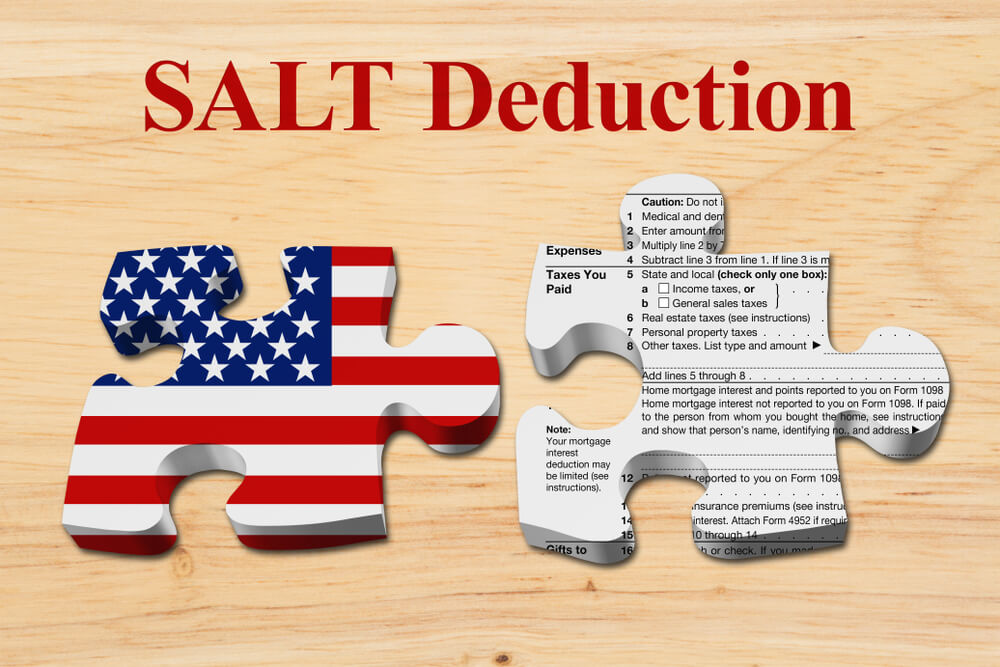President Donald Trump said he is open to considering a change to the SALT cap on federal deductions for state and local taxes, which is one of the most divisive pieces of the 2017 overhaul to the U.S. tax code.
The SALT cap limits the amount of state and local taxes, including property taxes, that you can deduct each year on your federal tax returns. The change to the tax law in the Tax Cuts and Jobs Act has led to higher taxes for people in places like New York, New Jersey, Connecticut, California and other high-tax states and municipalities.
“There are some people from New York who have been speaking to me about doing something about that, about changing things. It’s been severe on them,” he said.
Trump didn’t offer specifics on how the law could be changed, but just him mentioning it has led to major interest in high-tax areas and cities. The SALT cap has hammered taxpayers because of higher state taxes, property values and real estate taxes.
Per Bloomberg:
Revenue Raiser
The cap is a key revenue raiser in the $1.5 trillion tax-code overhaul, which slashed rates for business and individuals. Lifting the cap would cost around $673 billion over a decade, according to the conservative Tax Foundation, a sum that might require raising the newly lowered 21 percent corporate rate to absorb the cost.
Despite Trump’s remarks, the idea appeared to be dead already on Capitol Hill.
Senate Finance Committee Chairman Charles Grassley, via a spokesman, shot down the idea of altering the SALT cap.
“It’s ironic that the same Democrats who criticized the Tax Cuts and Jobs Act for supposedly benefiting only the wealthy are now advocating for a change to the law that would primarily benefit the wealthy,” Grassley spokesman Michael Zona said in a statement.
States with high local taxes are largely Democratic, and some officials in those states have complained that the cap was designed to punish Democratic voters.
In a tweet, Grassley’s committee termed the SALT deduction “a federal subsidy for states to raise taxes on their residence without political consequence.”
In three of the states most affected — California, New Jersey and New York — Republicans lost 14 U.S. House seats in the 2018 midterms, accounting for about a third of the party’s overall losses. Additionally, two key lawmakers in crafting the Republican tax overhaul — former Representatives Erik Paulsen of Minnesota and Peter Roskam of Illinois — lost their seats where the unpopularity of the new law was a major issue in their campaigns.
NY Taxpayers Flee
Senator Bob Menendez, a New Jersey Democrat, vowed Feb. 5 to block the nomination of Michael Desmond to become chief counsel at the Internal Revenue Service over the cap. New York Governor Andrew Cuomo said recently that the SALT cap and other tax changes had prompted a $2.3 billion shortfall in state revenue in December; he blamed the cap for causing some taxpayers to flee to states like Florida, which has no state income tax. In Connecticut, the cap will cause residents to pay an additional $2.8 billion in taxes for the 2018 tax year, according to state figures released last July.
Those three states, along with Maryland, sued the Treasury Department, the IRS and the Trump administration in Manhattan federal court in July, challenging the cap as infringing upon their state authority among other claims.
Westchester County
In New York’s Westchester County, the average property tax bill was $14,654, according to an April 2018 report by the New York State Association of Counties.
Democrats in Congress, including House Ways and Means Chairman Richard Neal of Massachusetts, have already vowed to tackle the SALT cap. “We are going to revisit the SALT deduction, I can tell you that,” he told a business forum on Nov. 27.
Still, it’s not clear that any changes would be enacted into law, given that many Republicans support the cap, as do many Democrats outside of the high-tax Northeast and California.
The annual SALT cap runs through the end of 2025. States have offered workarounds, but the IRS has blocked most of them, including one involving charitable donations in exchange for credits on property tax payments. The IRS hasn’t weighed in on a plan by Connecticut to offer owners of partnerships and other so-called pass-throughs a state credit equal to 93 percent of an owner’s paid state tax. The workaround allows taxpayers to convert a state business into a federal deduction.




